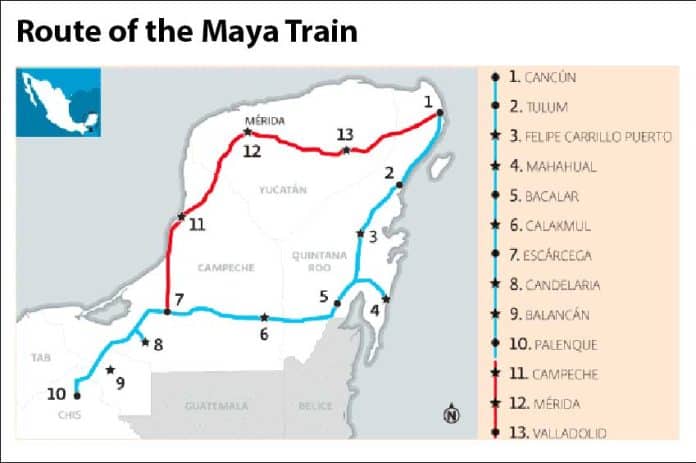The Cancún-Palenque train project is great news but only if funds currently allocated to tourism marketing are not used to build it, say two tourism industry officials.
“Yes, it’s justified because it would bring a lot of tourists to Mexico. The thing about the Maya route is that it’s a cultural and archaeological tourism product, which needs to be exploited more because to date we depend [too much] on sun and beach,” said Jorge Hernández, president of the Mexican Federation of Tourism Associations (Fematur).
“What worries us is that we want there to be more clarity about the origin of the public financing resources. Up to now, what’s been announced is that [tourism] promotion resources are going to be taken away and we are worried because if Mexico isn’t promoted, the tourists won’t arrive,” he added.
President-elect Andrés Manuel López Obrador announced Monday that the original 830-kilometer route has been extended to 1,500 kilometers and will include new stops in Mérida and Valladolid in Yucatán and three more in Campeche.
López Obrador said he intends to have the project ready to go to tender on December 1, the day he takes office, and that a public-private partnership will be pursued to fund it.
The contribution of the former will come from tourism taxation revenues, which he said generate 7 billion pesos (US $368.5 million) a year, money that is currently used mainly to promote tourism.
The total cost of the project, expected to be completed in four years or less, is estimated to be between 120 billion and 150 billion pesos (US $6.3 to $7.9 billion).
The government would contribute 28 billion pesos over four years and the private sector would provide the rest.
“I think it will be a success. I see it as a very good trigger [for the economy] in the southeast of the country,” said Rafael García, president of the Mexican Association of Hotels and Motels (AMHM).
“From a tourism point of view, it’s excellent but also from a business point of view . . .” he added before echoing Hernández’s concern about the origin of the public money.
“He [López Obrador] never spoke clearly about the DNR [tourist tax] . . . What we’re hoping is that the tourism [promotion] budget will be increased not cut,” he said.
“From our point of view, the promotion resources are untouchable. We would be left without this activity and having more complete tourism infrastructure would be of no use if tourism isn’t promoted,” Hernández reiterated.
More upbeat about the funding arrangement is Edmundo Gamas, director of the Mexican Institute of Infrastructure Development (Imexdi).
He said the project, dubbed the Maya Train, provides an excellent opportunity to show that a large-scale public-private rail project can be completed successfully in Mexico.
Gamas added that it is not a “preposterous” idea that the train will eventually pay for itself through the collection of passenger fares because, he charged, the train is aimed at well-off domestic and international tourists.
“Hopefully the project will be carried out with good planning, execution and transparency because if it can be done well it opens the door for other future projects of the same kind that are also needed in the country,” he said.
Source: El Economista (sp)
